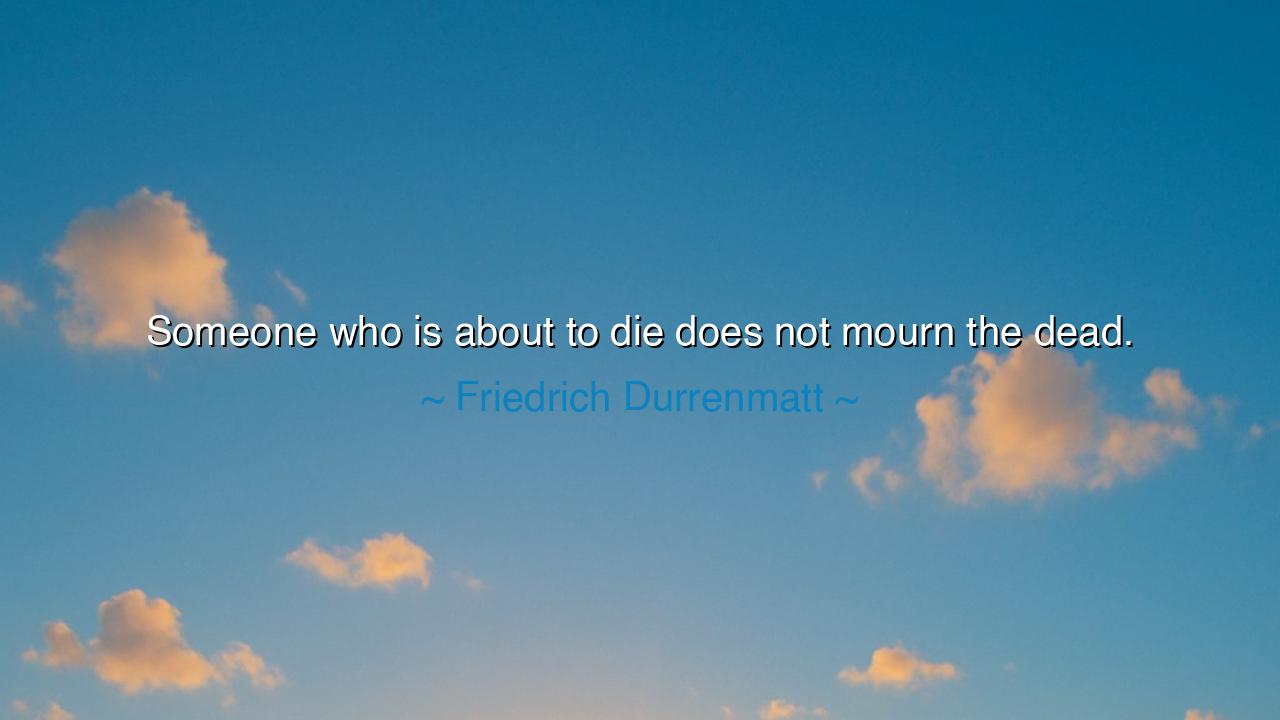
Someone who is about to die does not mourn the dead.






“Someone who is about to die does not mourn the dead.” Thus wrote Friedrich Dürrenmatt, the Swiss playwright and philosopher whose words strike with the cold clarity of a mountain wind. In this brief and somber reflection, he reveals a truth that is both simple and devastating: when one stands before the abyss of one’s own mortality, the sorrows of others — even the grief for the departed — fade into silence. The heart that once wept for the lost now turns inward, consumed by its own approaching end. For death, the great equalizer, strips away all pretense of distance. The living and the dead become one in its shadow, and mourning becomes meaningless, for soon, the mourner will join those he laments.
To understand the depth of Dürrenmatt’s words, we must first understand the world that shaped him. Living through the turbulent twentieth century, he witnessed war, cruelty, and the fragile masks that society wears to hide the truth of its impermanence. His works — filled with moral irony and philosophical despair — often wrestle with the absurdity of existence. In this quote, he does not speak of heartlessness, but of perspective. He means that when a person feels the breath of death upon their neck, they cease to dwell on what has already passed. The mind, facing its own dissolution, no longer reaches backward but fixes itself on the inescapable present. Fear, awe, and acceptance crowd out the luxury of lament.
It is not that the dying do not feel grief — they feel it more deeply than ever, but differently. The sorrow they once felt for others transforms into the quiet recognition of the shared fate of all beings. The boundary between the dead and the living dissolves. In that moment, the dying person no longer sees themselves as separate, but as part of the eternal cycle — birth, decay, and renewal. To mourn the dead is to cling to separation; to face one’s own death is to understand unity, the truth that all life is bound by the same thread, and all must return to the same silence.
Consider the example of Socrates, condemned to die for his teachings. On his final day, his disciples wept and begged him to flee. But Socrates, calm and composed, rebuked them gently. He spoke not of mourning those who had died, nor of the injustice of his fate, but of the immortality of the soul. “Why should I fear death,” he asked, “when I have spent my life preparing for it?” He did not mourn the dead because he no longer saw death as loss. He saw it as transformation, as the continuation of the soul’s journey. In that calm acceptance, we find the essence of Dürrenmatt’s thought: that one who faces death truly sees — and in seeing, transcends both grief and fear.
But Dürrenmatt’s insight carries a darker wisdom as well. It reminds us of the selfishness of survival — that while we live comfortably, we mourn others with ease, but when death touches us personally, all compassion contracts to the self. The dying man’s indifference to the dead is not cruelty; it is the raw honesty of one stripped of illusion. For when death approaches, it demands every ounce of attention, every breath of courage. The heart cannot bear both empathy for others and terror for itself; it must choose. And so, in those final hours, man stands naked — not as mourner, but as mortal.
Yet within this stark truth lies a luminous lesson. Dürrenmatt teaches us not to wait until death comes near to understand what it means to live. Those who accept death early — who contemplate it, who make peace with its certainty — are free to love life without clinging. They do not need to flee from grief or deny loss, because they already know the price of existence. Such a soul can mourn and rejoice at once, knowing that every joy is fleeting and therefore sacred. The wise do not mourn the dead with despair, nor their own mortality with fear; they honor both as parts of the same divine pattern.
So, my child, hear this wisdom: do not turn your eyes away from death, but let it teach you how to live. Do not wait until your final hour to stop mourning the past and to embrace the present. Every breath is a gift borrowed from eternity, every sunrise a reminder that you still stand among the living. Instead of fearing the inevitable, make peace with it now — for in doing so, you will learn compassion without attachment, gratitude without greed, and courage without illusion.
And when your time comes, you will not mourn the dead, nor yourself, but smile as one who finally understands the truth Dürrenmatt revealed: that in death, there is no division, no sorrow, and no end — only the quiet return to the great and eternal whole.






AAdministratorAdministrator
Welcome, honored guests. Please leave a comment, we will respond soon